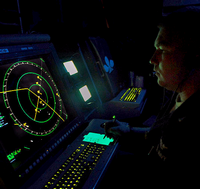Unlike the successful uprisings in neighboring Tunisia and Egypt, characterized by largely unarmed protests and government crackdowns with tear gas and bullets, Libya is now in the midst of a full-bore violent civil war. Refusing to stand down, Col. Moammar Gadhafi has vowed "to fight until the last man and last woman to defend Libya from east to west, north to south." While rebel forces have taken control of many town and cities, forces loyal to Gadhafi firmly control Tripoli, the country's capital, and have started to contest the rebels' control of strategic town and cities over the past week. The fighter jets and attack helicopters at Gadhafi's disposal will enable his forces to intensify the conflict, leading to the deaths of many more Libyans and expanding Gadhafi's territorial control.
Opposition leaders have called on the United Nations to authorize the imposition of a no-fly zone, but given Russia and China's resistance to these calls, the U.N. Security Council is unlikely to consider the request. There is a possibility that the Arab League and the African Union may partner to shut down Libya's airspace, but it is not clear which countries would lead this operation. Similarly, some European and American leaders have publicly discussed the possibility of using NATO to impose a no-fly zone over Libya.
Supporters of a no-fly zone claim that it would limit Gadhafi's ability to kill Libyans and fly in mercenaries and other supplies from neighboring countries. Libyan opposition figures also argue that a no-fly zone would shift the balance of military power in their favor, a view shared by U.S. Sens. John McCain and Joseph Lieberman as well as by British Foreign Minister William Hague and his Italian counterpart, Franco Frattini. Are these views correct?

